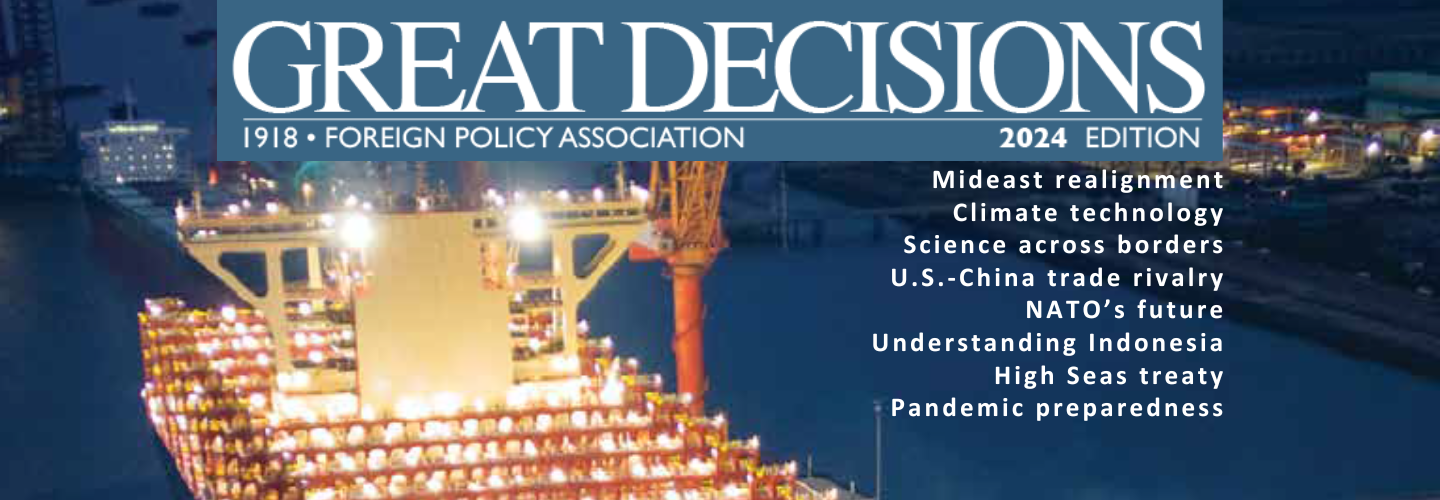
Great Decisions is America’s largest civic discussion program on world affairs. On Wednesday nights from 7pm-8pm starting on March 6th and ending on June 12th, we will meet bi-weekly to discuss one of eight critical foreign policy challenges facing Americans. In each bi-weekly session, a volunteer moderator will lead the group in discussing the selected topic in a non-partisan, open environment. Prior to each session, participants will read the relevant chapter in the Great Decisions Briefing Book and watch the corresponding Master Class, which will be provided to participants for free. Participants are encouraged to attend all eight sessions but you may choose to attend only certain topics.
Registration is required for each session and will be limited to 20 participants. Register online using the registration links below or by calling the reference desk at 508-457-2555 x7.
This program is sponsored by the Library Support Fund.
Wednesday, March 6th from 7pm-8pm in the Hermann meeting room
The United States and Middle East are at a crossroads. In spite of a reduced presence in the Middle East, the U.S. still has significant national interests there and the area is a key arena for global power politics. Can the U.S. continue to defend its interests in the Middle East and globally with a lower level of military and political involvement, or should it recommit to a leading role in the region? By Marc Lynch
Wednesday, March 20th from 7pm-8pm in the Hermann meeting room
Will the United States and China, with other powerful countries following suit, approach current and future climate initiatives with an increased commitment to trade protectionism and nationalism, by various measures including trade restrictions? Or could a growing spirit of international accord develop to confront the “common enemy” of climate change? By Bud Ward
Wednesday, April 3rd from 7pm-8pm in the Hermann meeting room
Scientific advances benefit from collaboration between researchers, but what happens when material, such as Artificial Intelligence (AI) is controversial and important to a nation’s national security? Is there a middle ground between sharing information and denying access? How can we regulate cooperation? By Mila Rosenthal
Wednesday, April 17th from 7pm-8pm in the Hermann meeting room
China’s economic rise and its current policies of increasing the role of the state in the economy have led some U.S. policymakers to seek to deny China access to U.S. technology and investment. This is seen as a necessary corrective to decades of predatory Chinese economic policies. Is this a wise strategy, and how effective can it be? By Jonathan Chanis
Wednesday, May 1st from 7pm-8pm in the Hermann meeting room
Since the Russian invasion of Ukraine in February 2022, the North Atlantic Treaty Organization (NATO) has come under increased scrutiny, not because NATO troops are involved in the conflict, but because of its role in relations between Russia and its neighbors. Will expanding membership in NATO protect countries, or will it further provoke Russia? By Sarwar Kashmeri
Wednesday, May 15th from 7pm-8pm in the Hermann meeting room
Despite its large size, Indonesia remains virtually invisible to most Americans. But as one of the world’s largest democracies, the world’s largest Muslim-majority nation, and as an economic driver of ASEAN, why does it fly below the radar? What are current issues in U.S.-Indonesian relations, and what role can the country play in Asia? By Charles Sullivan
Wednesday, May 29th from 7pm-8pm in the Hermann meeting room
Areas of the seas beyond national jurisdiction comprise the high seas, which are facing a degradation of ecosystems due to climate change and the increase in human activities, such as shipping, overfishing, pollution, and deep-sea mining. The recently negotiated High Seas Treaty, also known as the Biodiversity Beyond National Jurisdiction treaty, will attempt to address these issues. How difficult will it be to convince nations to participate? By FPA Editors
Wednesday, June 12th from 7pm-8pm in the Hermann meeting room
Looking back at the covid-19 pandemic, there are many lessons to take away in terms of domestic and international policies. Although this pandemic seems to have waned, how can we apply these lessons to future pandemics? Will countries cooperate, and will a consensus emerge on how to manage global health challenges? By Carolyn Reynolds

